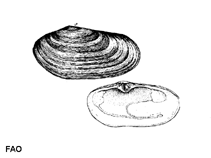Lutraria angustior Philippi, 1844
| Native range | All suitable habitat | Point map | Year 2050 |

|
| This map was computer-generated and has not yet been reviewed. |
| Lutraria angustior AquaMaps Data sources: GBIF OBIS |
Classification / Names Common names | Synonyms | CoL | ITIS | WoRMS
Bivalvia | Venerida | Mactridae
Environment: milieu / climate zone / depth range / distribution range Ecology
Benthic; depth range 5 - 25 m (Ref. 2758). Subtropical
Distribution Countries | FAO areas | Ecosystems | Occurrences | Introductions
Northeast Atlantic and the Mediterranean.
Length at first maturity / Size / Weight / Age
Maturity: Lm ? range ? - ? cm Max length : 5.1 cm SHL male/unsexed; (Ref. 2758); common length : 3.5 cm DL male/unsexed; (Ref. 2758)
Life cycle and mating behavior Maturity | Reproduction | Spawning | Eggs | Fecundity | Larvae
Main reference
References | Coordinator | Collaborators
Gaspar, M.B., M.N. Santos and P. Vasconcelos 2001 Weight-length relationships of 25 bivalve species (Mollusca: Bivalvia) from the Algarve coast (southern Portugal). J. Mar. Biol. Ass. U.K. 81:805-807. (Ref. 2758)
IUCN Red List Status
(Ref. 130435: Version 2025-1)
CITES status (Ref. 108899)
CMS (Ref. 116361)
Threat to humans
Human uses
| FishSource |
Tools
More information
Diet composition
Food consumption
Predators
Max. ages / sizes
Length-weight rel.
Length-length rel.
Length-frequencies
Mass conversion
Abundance
Internet sources
BHL | BOLD Systems | CISTI | DiscoverLife | FAO(Publication : search) | Fishipedia | GenBank (genome, nucleotide) | GloBI | Gomexsi | Google Books | Google Scholar | Google | PubMed | Tree of Life | Wikipedia (Go, Search) | Zoological Record



